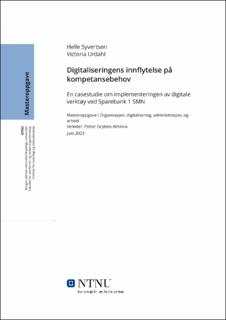| dc.description.abstract | Digitalisering har bragt store endringer i virksomheters omgivelser som har ført til økt
endringspress. Endringsprosessene er ofte knyttet til digitalisering og automatisering av
arbeidsoppgaver som får konsekvenser for virksomhetens arbeidstakere. Studien har to formål:
undersøke implementeringen av ny teknologi i en endringsprosess og sette søkelys på hvordan
automatisering av arbeidsoppgaver påvirker behovet for kompetanse. Basert på oppgavens formål
er følgende problemstilling formulert: “På hvilken måte har Sparebank 1 SMN implementert det
nye CRM systemet Iver, og hvordan endres kompetansebehovet som følger av automatisering?”
For å svare på problemstillingen har vi gjennomført en kvalitativ casestudie av implementeringen
av det nye CRM-systemet Iver. Dette systemet benyttes av kunderådgiverne og er bankens
trafikksystem for å håndtere kundekontakt. I systemet ligger også verktøyene Sparesløyfen,
Servicemodellen og Relevante Initiativ. Disse har ført til betydelige endringer for
kunderådgivernes arbeidsmåte, og er derfor også sentrale i studien. Studiens empiriske grunnlag er
innhentet gjennom dybdeintervjuer med tolv ansatte ved Sparebank 1 SMN.
Lewins (1947) “Ice-Block modell”, Kotters (2012) “åtte-trinn modell” og Schiefloe (2003) sin
modell for teknologiske endringsprosesser utgjør det teoretiske grunnlaget for den delen av
oppgaven som omhandler endringsprosessen. Videre benyttes blant annet Lais (2016) definisjon
på formell og uformell kompetanse og Bravermans (1998) de-skillingshypotese for å belyse
hvordan automatisering påvirker kompetanse og kompetansebehov ved bedriften.
Funnene fra studien viser at automatisering påvirker kompetansebehovet, og at den relasjonelle
kompetansen som mennesker besitter blir viktigere. Videre kan automatisering og organisering av
arbeidsoppgaver sees i lys av Taylorisme ved at det kan føre til en de-skilling av
kunderådgiverrollen. Første implementering i 2018 hadde store mangler, hvilket resulterte i at
endringsprosessen og implementeringen av de digitale verktøyene varte i overkant av fire år. Dette
gjaldt særlig implementeringen av Relevante Initiativ | |
| dc.description.abstract | Digitalization has brought significant changes to the business environment, leading to increased
pressure for change. The change processes are often associated with the digitization and automation
of tasks, which have consequences for the organization's employees. This study has two objectives:
to investigate the implementation of new technology in a change process and to focus on how the
automation of tasks affects competence and competence requirements. Based on the purpose of
this study, the following research question has been formulated: “In what way has Sparebank 1
SMN implemented the new CRM system, Iver, and how does the automation impact the
competence requirements?”
To address the research question, we conducted a qualitative case study of the implementation of
the new CRM system, Iver. This system is utilized by customer advisors and serves as the bank's
traffic system for managing customer contacts. The system also incorporates tools such as
Sparesløyfen, Servicemodellen, and Relevante Initiativ, which have resulted in significant changes
to the work practices of customer advisors and are thus central to this study. The empirical basis
for this study was gathered through in-depth interviews with twelve employees at Sparebank 1
SMN.
The theoretical foundation for the section of the study concerning the change process is based on
Lewin's (1947) "Ice-Block model," Kotter's (2012) "eight-step model," and Schiefloe's (2003)
model for technological change processes. Additionally, Lai's (2016) definition of formal and
informal competence and Braverman's (1998) deskilling hypothesis are employed to shed light on
how automation affects competence and competence requirements within the company.
The findings of the study demonstrate that automation impacts the competence requirements, with
an increased emphasis on the relational competence possessed by humans. Furthermore, the
automation and organization of tasks can be viewed through the lens of Taylorism, as it may lead
to the de-skilling of the customer advisor role. During the initial implementation in 2018, there
were issues such as inadequate training and follow-up, resulting in the change process and
implementation of the digital tools lasting over four years. This was particularly evident in the
implementation of Relevante Initiativ | |
